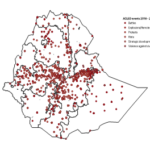This study compiles and standardizes large-scale national household surveys conducted twice a year between 2018 and 2023 in Mali, Chad, Niger, and Burkina Faso. These surveys capture data on household food security and coping strategies. Source: IFPRI Africa Regional Office (AFR)
Data Collection: Actionable Research to Inform Rehabilitation and Rebuilding of Livelihoods in Conflict-Affected Communities in Ethiopia
Over the last two decades, Ethiopia achieved rapid and substantial economic growth and development and maintained relative stability within the volatile Horn of Africa region. However, more recently, Ethiopia continue to face major challenges arising from internal conflicts and related shocks. A recent conflict that broke out in November 2020 in Tigray resulted in major […] Source: IFPRI Ethiopia: Ethiopia Strategy Support Program
Datasets
The people of Myanmar are becoming increasingly vulnerable due to the impact of a wide range of shocks, including the COVID-19 pandemic, political instability, armed conflict, global economic disruptions, and climate change. The collection of high-freq... Source: IFPRI Myanmar – The Myanmar Strategy Support Program
Subnational datasets of key COVID-19 risk indicators and potential risk hotspots
As COVID-19 vaccines are becoming available, governments will need to assess the number and location of the most vulnerable people within their populations. However, problematically, tracking data for most low- and middle-income countries are only available at the national level. To support the COVID-19 relief effort, GCAN was commissioned to develop a subnational dataset of […] Source: Gender, Climate Change, and Nutrition Integration Initiative (GCAN)
Feed the Future Data Harmonization – USAID Seminar Presentation, June 7, 2018
On June 7, Carlo Azzarri with Zhe Guo presented a seminar on the GCAN Data Harmonization to the USAID Feed the Future's Monitoring, Evaluation, and Learning (MEL) team. The seminar featured GCAN’s ongoing efforts to harmonize and standardize Feed the Future Population-Based Survey datasets across gender, agriculture, nutrition, and climate dimensions. Using the available FTF […] Source: Gender, Climate Change, and Nutrition Integration Initiative (GCAN)

